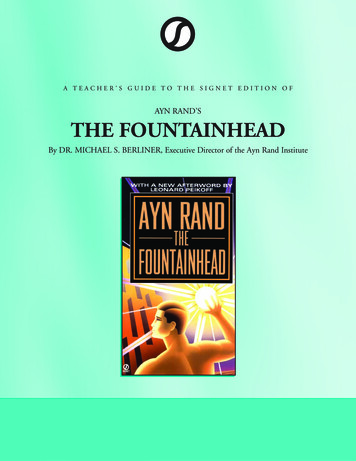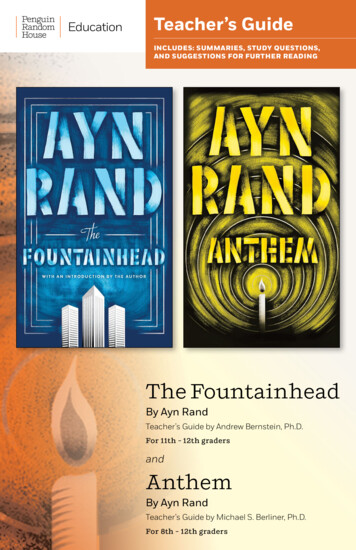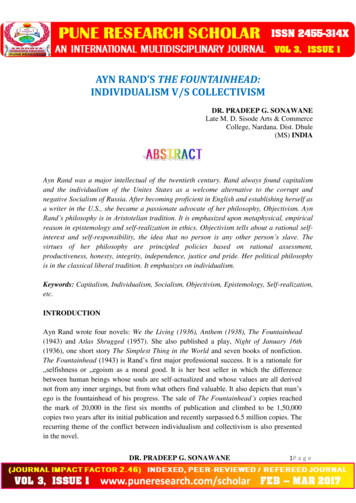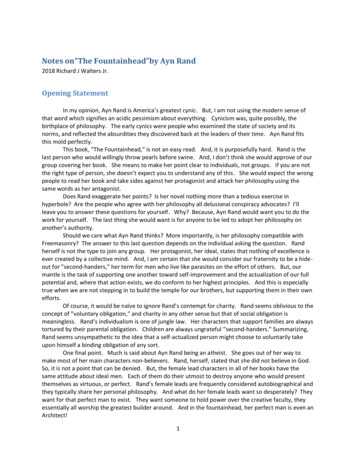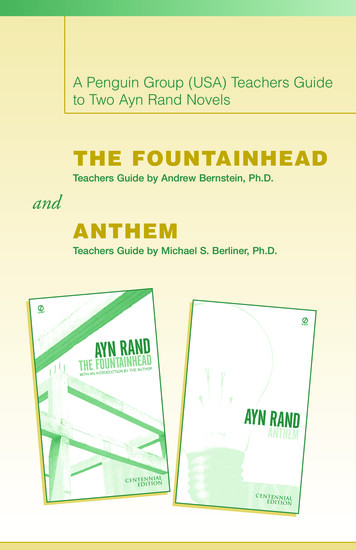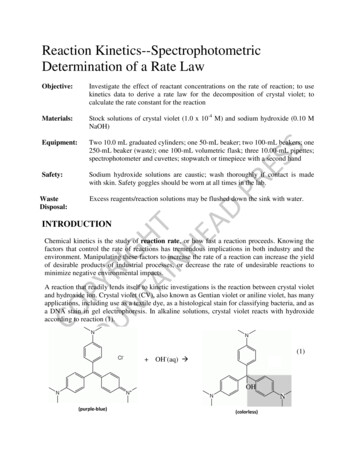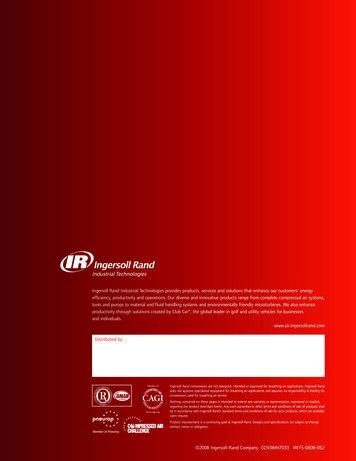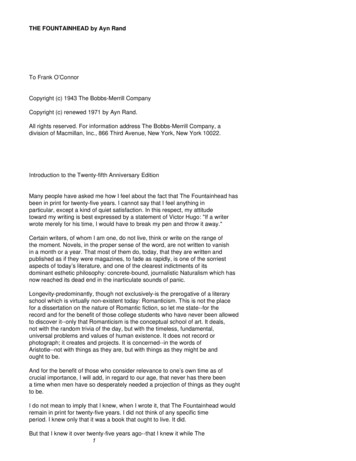
Transcription
THE FOUNTAINHEAD by Ayn RandTo Frank O’ConnorCopyright (c) 1943 The Bobbs-Merrill CompanyCopyright (c) renewed 1971 by Ayn Rand.All rights reserved. For information address The Bobbs-Merrill Company, adivision of Macmillan, Inc., 866 Third Avenue, New York, New York 10022.Introduction to the Twenty-fifth Anniversary EditionMany people have asked me how I feel about the fact that The Fountainhead hasbeen in print for twenty-five years. I cannot say that I feel anything inparticular, except a kind of quiet satisfaction. In this respect, my attitudetoward my writing is best expressed by a statement of Victor Hugo: "If a writerwrote merely for his time, I would have to break my pen and throw it away."Certain writers, of whom I am one, do not live, think or write on the range ofthe moment. Novels, in the proper sense of the word, are not written to vanishin a month or a year. That most of them do, today, that they are written andpublished as if they were magazines, to fade as rapidly, is one of the sorriestaspects of today’s literature, and one of the clearest indictments of itsdominant esthetic philosophy: concrete-bound, journalistic Naturalism which hasnow reached its dead end in the inarticulate sounds of panic.Longevity-predominantly, though not exclusively-is the prerogative of a literaryschool which is virtually non-existent today: Romanticism. This is not the placefor a dissertation on the nature of Romantic fiction, so let me state--for therecord and for the benefit of those college students who have never been allowedto discover it--only that Romanticism is the conceptual school of art. It deals,not with the random trivia of the day, but with the timeless, fundamental,universal problems and values of human existence. It does not record orphotograph; it creates and projects. It is concerned--in the words ofAristotle--not with things as they are, but with things as they might be andought to be.And for the benefit of those who consider relevance to one’s own time as ofcrucial importance, I will add, in regard to our age, that never has there beena time when men have so desperately needed a projection of things as they oughtto be.I do not mean to imply that I knew, when I wrote it, that The Fountainhead wouldremain in print for twenty-five years. I did not think of any specific timeperiod. I knew only that it was a book that ought to live. It did.But that I knew it over twenty-five years ago--that I knew it while The1
Fountainhead was being rejected by twelve publishers, some of whom declared thatit was "too intellectual,""too controversial" and would not sell because no audience existed for it--thatwas the difficult part of its history; difficult for me to bear. I mention ithere for the sake of any other writer of my kind who might have to face the samebattle--as a reminder of the fact that it can be done.It would be impossible for me to discuss The Fountainhead or any part of itshistory without mentioning the man who made it possible for me to write it: myhusband, Frank O’Connor.In a play I wrote in my early thirties, Ideal, the heroine, a screen star,speaks for me when she says: "I want to see, real, living, and in the hours ofmy own days, that glory I create as an illusion. I want it real. I want to knowthat there is someone, somewhere, who wants it, too. Or else what is the use ofseeing it, and working, and burning oneself for an impossible vision? A spirit,too, needs fuel. It can run dry."Frank was the fuel. He gave me, in the hours of my own days, the reality of thatsense of life, which created The Fountainhead--and he helped me to maintain itover a long span of years when there was nothing around us but a gray desert ofpeople and events that evoked nothing but contempt and revulsion. The essence ofthe bond between us is the fact that neither of us has ever wanted or beentempted to settle for anything less than the world presented in TheFountainhead. We never will.If there is in me any touch of the Naturalistic writer who records "real-life"dialogue for use in a novel, it has been exercised only in regard to Frank. Forinstance, one of the most effective lines in The Fountainhead comes at the endof Part II, when, in reply to Toohey’s question: "Why don’t you tell me what youthink of me?" Roark answers: "But I don’t think of you." That line was Frank’sanswer to a different type of person, in a somewhat similar context. "You’recasting pearls without getting even a pork chop in return," was said by Frank tome, in regard to my professional position. I gave that line to Dominique atRoark’s trial.I did not feel discouragement very often, and when I did, it did not last longerthan overnight. But there was one evening, during the writing of TheFountainhead, when I felt so profound an indignation at the state of "things asthey are" that it seemed as if I would never regain the energy to move one stepfarther toward "things as they ought to be." Frank talked to me for hours, thatnight. He convinced me of why one cannot give up the world to those onedespises. By the time he finished, my discouragement was gone; it never cameback in so intense a form.I had been opposed to the practice of dedicating books; I had held that a bookis addressed to any reader who proves worthy of it. But, that night, I toldFrank that I would dedicate The Fountainhead to him because he had saved it. Andone of my happiest moments, about two years later, was given to me by the lookon his face when he came home, one day, and saw the page-proofs of the book,headed by the page that stated in cold, clear, objective print: To FrankO’Connor.I have been asked whether I have changed in these past twenty-five years. No, Iam the same--only more so. Have my ideas changed? No, my fundamentalconvictions, my view of life and of man, have never changed, from as far back asI can remember, but my knowledge of their applications has grown, in scope andin precision. What is my present evaluation of The Fountainhead? I am as proud2
of it as I was on the day when I finished writing it.Was The Fountainhead written for the purpose of presenting my philosophy? Here,I shall quote from The Goal of My Writing, an address I gave at Lewis and ClarkCollege, on October 1, 1963: "This is the motive and purpose of my writing; theprojection of an ideal man. The portrayal of a moral ideal, as my ultimateliterary goal, as an end in itself--to which any didactic, intellectual orphilosophical values contained in a novel are only the means."Let me stress this: my purpose is not the philosophical enlightenment of myreaders.My purpose, first cause and prime mover is the portrayal of HowardRoark [or the heroes of Atlas Shrugged} as an end in himself."I write--and read--for the sake of the story.My basic test for any story is:’Would I want to meet these characters and observe these events in real life? Isthis story an experience worth living through for its own sake? Is the pleasureof contemplating these characters an end in itself?’."Since my purpose is the presentation of an ideal man, I had to define andpresent the conditions which make him possible and which his existence requires.Since man’s character is the product of his premises, I had to define andpresent the kinds of premises and values that create the character of an idealman and motivate his actions; which means that I had to define and present arational code of ethics. Since man acts among and deals with other men, I had topresent the kind of social system that makes it possible for ideal men to existand to function--a free, productive, rational system which demands and rewardsthe best in every man, and which is, obviously, laissez-faire capitalism."But neither politics nor ethics nor philosophy is an end in itself, neither inlife nor in literature. Only Man is an end in himself."Are there any substantial changes I would want to make in The Fountainhead?No--and, therefore, I have left its text untouched. I want it to stand as it waswritten. But there is one minor error and one possibly misleading sentence whichI should like to clarify, so I shall mention them here.The error is semantic: the use of the word "egotist" in Roark’s courtroomspeech, while actually the word should have been "egoist." The error was causedby my reliance on a dictionary which gave such misleading definitions of thesetwo words that "egotist" seemed closer to the meaning I intended (Webster’sDaily Use Dictionary, 1933). (Modern philosophers, however, are guiltier thanlexicographers in regard to these two terms.)The possibly misleading sentence is in Roark’s speech: "From this simplestnecessity to the highest religious abstraction, from the wheel to theskyscraper, everything we are and everything we have comes from a singleattribute of man--the function of his reasoning mind."This could be misinterpreted to mean an endorsement of religion or religiousideas. I remember hesitating over that sentence, when I wrote it, and decidingthat Roark’s and my atheism, as well as the overall spirit of the book, were soclearly established that no one would misunderstand it, particularly since Isaid that religious abstractions are the product of man’s mind, not ofsupernatural revelation.But an issue of this sort should not be left to implications. What I wasreferring to was not religion as such, but a special category of abstractions,the most exalted one, which, for centuries, had been the near-monopoly ofreligion: ethics--not the particular content of religious ethics, but the3
abstraction "ethics," the realm of values, man’s code of good and evil, with theemotional connotations of height, uplift, nobility, reverence, grandeur, whichpertain to the realm of man’s values, but which religion has arrogated toitself.The same meaning and considerations were intended and are applicable to anotherpassage of the book, a brief dialogue between Roark and Hopton Stoddard, whichmay be misunderstood if taken out of context:"’You’re a profoundly religious man, Mr. Roark--in your own way. I can see thatin your buildings.’"’That’s true,’ said Roark."In the context of that scene, however, the meaning is clear: it is Roark’sprofound dedication to values, to the highest and best, to the ideal, thatStoddard is referring to (see his explanation of the nature of the proposedtemple). The erection of the Stoddard Temple and the subsequent trial state theissue explicitly.This leads me to a wider issue which is involved in every line of TheFountainhead and which has to be understood if one wants to understand thecauses of its lasting appeal.Religion’s monopoly in the field of ethics has made it extremely difficult tocommunicate the emotional meaning and connotations of a rational view of life.Just as religion has preempted the field of ethics, turning morality againstman, so it has usurped the highest moral concepts of our language, placing themoutside this earth and beyond man’s reach. "Exaltation" is usually taken to meanan emotional state evoked by contemplating the supernatural. "Worship" means theemotional experience of loyalty and dedication to something higher than man."Reverence" means the emotion of a sacred respect, to be experienced on one’sknees. "Sacred" means superior to and not-to-be-touched-by any concerns of manor of this earth. Etc.But such concepts do name actual emotions, even though no supernatural dimensionexists; and these emotions are experienced as uplifting or ennobling, withoutthe self-abasement required by religious definitions. What, then, is theirsource or referent in reality? It is the entire emotional realm of man’sdedication to a moral ideal. Yet apart from the man-degrading aspects introducedby religion, that emotional realm is left unidentified, without concepts, wordsor recognition.It is this highest level of man’s emotions that has to be redeemed from the murkof mysticism and redirected at its proper object: man.It is in this sense, with this meaning and intention, that I would identify thesense of life dramatized in The Fountainhead as man-worship.It is an emotion that a few--a very few--men experience consistently; some menexperience it in rare, single sparks that flash and die without consequences;some do not know what I am talking about; some do and spend their lives asfrantically virulent spark-extinguishers.Do not confuse "man-worship" with the many attempts, not to emancipate moralityfrom religion and bring it into the realm of reason, but to substitute a secularmeaning for the worst, the most profoundly irrational elements of religion. Forinstance, there are all the variants of modern collectivism (communist, fascist,Nazi, etc.), which preserve the religious-altruist ethics in full and merely4
substitute "society" for God as the beneficiary of man’s self-immolation. Thereare the various schools of modern philosophy which, rejecting the law ofidentity, proclaim that reality is an indeterminate flux ruled by miracles andshaped by whims--not God’s whims, but man’s or "society’s." These neo-mysticsare not man-worshipers; they are merely the secularizers of as profound a hatredfor man as that of their avowedly mystic predecessors.A cruder variant of the same hatred is represented by those concrete-bound,"statistical" mentalities who--unable to grasp the meaning of man’svolition--declare that man cannot be an object of worship, since they have neverencountered any specimens of humanity who deserved it.The man-worshipers, in my sense of the term, are those who see man’s highestpotential and strive to actualize it. The man-haters are those who regard man asa helpless, depraved, contemptible creature--and struggle never to let himdiscover otherwise. It is important here to remember that the only direct,introspective knowledge of man anyone possesses is of himself.More specifically, the essential division between these two camps is: thosededicated to the exaltation of man’s self-esteem and the sacredness of hishappiness on earth--and those determined
Fountainhead, when I felt so profound an indignation at the state of "things as they are" that it seemed as if I would never regain the energy to move one step farther toward "things as they ought to be." Frank talked to me for hours, that night. He convinced me of why one cannot give up the world to those one despises. By the time he finished, my discouragement was gone; it never came back in .File Size: 2MBPage Count: 615Explore further[PDF] Download The Fountainhead EBook Freeurpdfs.com[PDF] The Fountainhead Book by Ayn Rand Free Download (720 .blindhypnosis.comCONTENTSthetexasrepublic.comThe Fountainhead AynRand.orgaynrand.orgAYN RAND - INSTITUTE OF ECONOMIC AFFAIRS — Institute of .iea.org.ukRecommended to you based on what's popular Feedback
